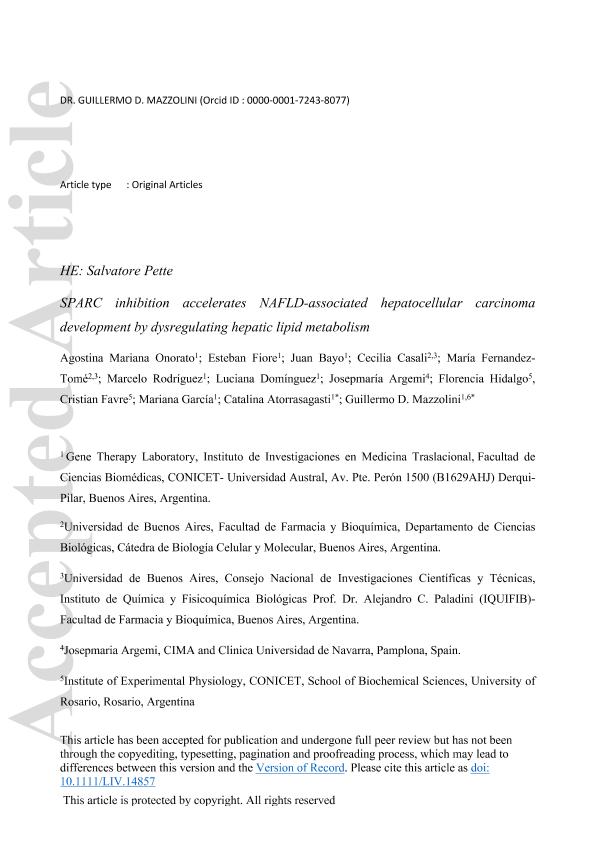Artículo
SPARC inhibition accelerates NAFLD-associated hepatocellular carcinoma development by dysregulating hepatic lipid metabolism
Onorato, Agostina Mariana ; Fiore, Esteban Juan
; Fiore, Esteban Juan ; Bayo Fina, Juan Miguel
; Bayo Fina, Juan Miguel ; Casali, Cecilia Irene
; Casali, Cecilia Irene ; Fernandez, Maria del Carmen
; Fernandez, Maria del Carmen ; Rodriguez, Marcelo Maximiliano
; Rodriguez, Marcelo Maximiliano ; Domínguez, Luciana María
; Domínguez, Luciana María ; Argemi, Josepmaría; Hidalgo, Florencia
; Argemi, Josepmaría; Hidalgo, Florencia ; Favre, Cristian
; Favre, Cristian ; García, Mariana; Atorrasagasti, María Catalina
; García, Mariana; Atorrasagasti, María Catalina ; Mazzolini Rizzo, Guillermo Daniel
; Mazzolini Rizzo, Guillermo Daniel
 ; Fiore, Esteban Juan
; Fiore, Esteban Juan ; Bayo Fina, Juan Miguel
; Bayo Fina, Juan Miguel ; Casali, Cecilia Irene
; Casali, Cecilia Irene ; Fernandez, Maria del Carmen
; Fernandez, Maria del Carmen ; Rodriguez, Marcelo Maximiliano
; Rodriguez, Marcelo Maximiliano ; Domínguez, Luciana María
; Domínguez, Luciana María ; Argemi, Josepmaría; Hidalgo, Florencia
; Argemi, Josepmaría; Hidalgo, Florencia ; Favre, Cristian
; Favre, Cristian ; García, Mariana; Atorrasagasti, María Catalina
; García, Mariana; Atorrasagasti, María Catalina ; Mazzolini Rizzo, Guillermo Daniel
; Mazzolini Rizzo, Guillermo Daniel
Fecha de publicación:
07/2021
Editorial:
Wiley Blackwell Publishing, Inc
Revista:
Liver International
ISSN:
1478-3223
Idioma:
Inglés
Tipo de recurso:
Artículo publicado
Clasificación temática:
Resumen
Background and aims: Non-alcoholic fatty liver (NAFLD) and its more serious form non-alcoholic steatohepatitis increase risk of hepatocellular carcinoma (HCC). Lipid metabolic alterations and its role in HCC development remain unclear. SPARC (Secreted Protein, Acidic and Rich in Cysteine) is involved in lipid metabolism, NAFLD and diabetes, but the effects on hepatic lipid metabolism and HCC development is unknown. The aim of this study was to evaluate the role of SPARC in HCC development in the context of NAFLD. Methods: Primary hepatocyte cultures from knockout (SPARC−/−) or wild-type (SPARC+/+) mice, and HepG2 cells were used to assess the effects of free fatty acids on lipid accumulation, expression of lipogenic genes and de novo triglyceride (TG) synthesis. A NAFLD-HCC model was stabilized on SPARC−/− or SPARC+/+ mice. Correlations among SPARC, lipid metabolism-related gene expression patterns and clinical prognosis were studied using HCC gene expression dataset. Results: SPARC−/− mice increases hepatic lipid deposits over time. Hepatocytes from SPARC−/− mice or inhibition of SPARC by an antisense adenovirus in HepG2 cells resulted in increased TG deposit, expression of lipid-related genes and nuclear translocation of SREBP1c. Human HCC database analysis revealed that SPARC negatively correlated with genes involved in lipid metabolism, and with poor survival. In NAFLD-HCC murine model, the absence of SPARC accelerates HCC development. RNA-seq study revealed that pathways related to lipid metabolism, cellular detoxification and proliferation were upregulated in SPARC−/− tumour-bearing mice. Conclusions: The absence of SPARC is associated with an altered hepatic lipid metabolism, and an accelerated NAFLD-related HCC development.
Archivos asociados
Licencia
Identificadores
Colecciones
Articulos(IFISE)
Articulos de INST.DE FISIOLOGIA EXPERIMENTAL (I)
Articulos de INST.DE FISIOLOGIA EXPERIMENTAL (I)
Articulos(IIMT)
Articulos de INSTITUTO DE INVESTIGACIONES EN MEDICINA TRASLACIONAL
Articulos de INSTITUTO DE INVESTIGACIONES EN MEDICINA TRASLACIONAL
Articulos(IQUIFIB)
Articulos de INST.DE QUIMICA Y FISICO-QUIMICA BIOLOGICAS "PROF. ALEJANDRO C. PALADINI"
Articulos de INST.DE QUIMICA Y FISICO-QUIMICA BIOLOGICAS "PROF. ALEJANDRO C. PALADINI"
Citación
Onorato, Agostina Mariana; Fiore, Esteban Juan; Bayo Fina, Juan Miguel; Casali, Cecilia Irene; Fernandez, Maria del Carmen; et al.; SPARC inhibition accelerates NAFLD-associated hepatocellular carcinoma development by dysregulating hepatic lipid metabolism; Wiley Blackwell Publishing, Inc; Liver International; 41; 7; 7-2021; 1677-1693
Compartir
Altmétricas



